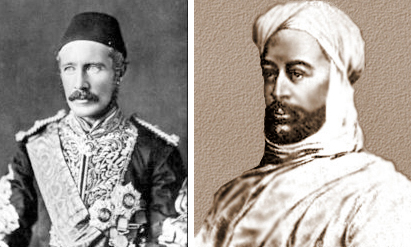
General Charles Gordon, left; Muhammad Ahmad, the Sudanese mahdi, right
The current crisis in Mali, which has now spilled over into neighboring Algeria, is the latest outbreak of mahdi madness on the African continent. In Islamic eschatology, the mahdi is a savior of the Muslim community near the time of the apocalypse. The British colonial empire faced several mad mullahs when they tried to rule Sudan. One such infamous mahdi was Muhammad Ahmad, who proclaimed himself the leader of the Muslims against the Turkish oppressors in the 1870s. On January 26, 1885 the Mahdists following Abdullah Taashi took control of Khartoum, slaughtering the entire British garrison, including General Charles Gordon, before a relief force could reach the besieged city. These were the days in which a mahdi could inspire an army, over 50,000 men in the case of the force that overran Khartoum. In 1898 Lord Kitchener led a British invasion force of over 8,000 men assisted by 17,600 Sudanese and Egyptian troops. The British gunboat diplomacy resulted in a resounding defeat for the Mahdists at the Battle of Omdurman. Kitchener lost 47 men with 340 wounded, while the the Mahdists suffered 9,700 killed, 13,000 wounded, and 5,000 captured.
The Sudanese mahdi and the mad mullahs the British encountered in 19th century Afghanistan were not pietist reformers, but leaders of jihad against the hated occupier, whether fellow Muslim Ottoman Turks or infidel Europeans. The current crisis in Mali is an echo of past mahdis, but with a modern twist. The twist is how we now define a never-ending war on terrorism. Western views of the entire region entrapped by al-Qaeda confuse the situation on the ground. Most of the Mali rebels are not adopting an Osama Bin Laden call for a conservative 7th century caliphate. There are several groups that have more to do with ethnic conflict than jihad. One group is the MNLA (National Movement for the Liberation of Azawad), which is made up almost entirely of Tuaregs, who want an independent state. Then there is the FLNA (National Front for the Liberation of Azawad), an Arab group which wants self-determination for the people of northern Mali, but is not calling for a shariah state. These are opposed by the Ganda Koy (Masters of the Earth), a Songhai militia with no love of the Tuareg. The Fulani have their own group.
The really bad guys, at least from a terrorism perspective, are Al-Qaeda in the Islamic Maghreb (AQIM), who are not indigenous to Mali but who have used the unrest to gain traction. Their kidnappings over the years have resulted in sizeable ransoms to fuel their acts and spread their message. The top leader of AQIM is an Algerian, which explains in part the rationale for the recent attack on the Algerian gas complex. The local variant of AQIM is Ansar al-Dine, which wants shariah law not only for Mali but for the entire Muslim world. All of these groups are fluid and split apart easily. Local interests dominate, but zealots can easily take advantage of local unrest to preach the rhetoric of a global jihad.
Unlike the Sudanese mahdi, none of these groups can pull together a fighting force in the tens of thousands. Their days would appear to be numbered, not only because of the French entry into the scene but due to units arriving from other West African countries, especially Chad, assisting the government of Mali in winning back areas controlled by one or another of these local political groups. The daring raid at Ein Amenas captured the attention of the world’s media, but was doomed from the start. If anything, this raid will only accelerate coordinated attacks on the rebel forces. By killing foreign hostages, even if some were simply put into a position to be killed during later raids, France and other friends of Mali have a convenient excuse to do a Libya against the groups now controlling most of northern Mali. Reports of atrocities against civilians by groups such as AQIM will serve to hasten the drones.
Tourists will eventually roam again the alleys of Timbuctu, but other mahdis will pop up as long as there are local political aspirations unresolved. The madness has a long history and there is no cure in sight.